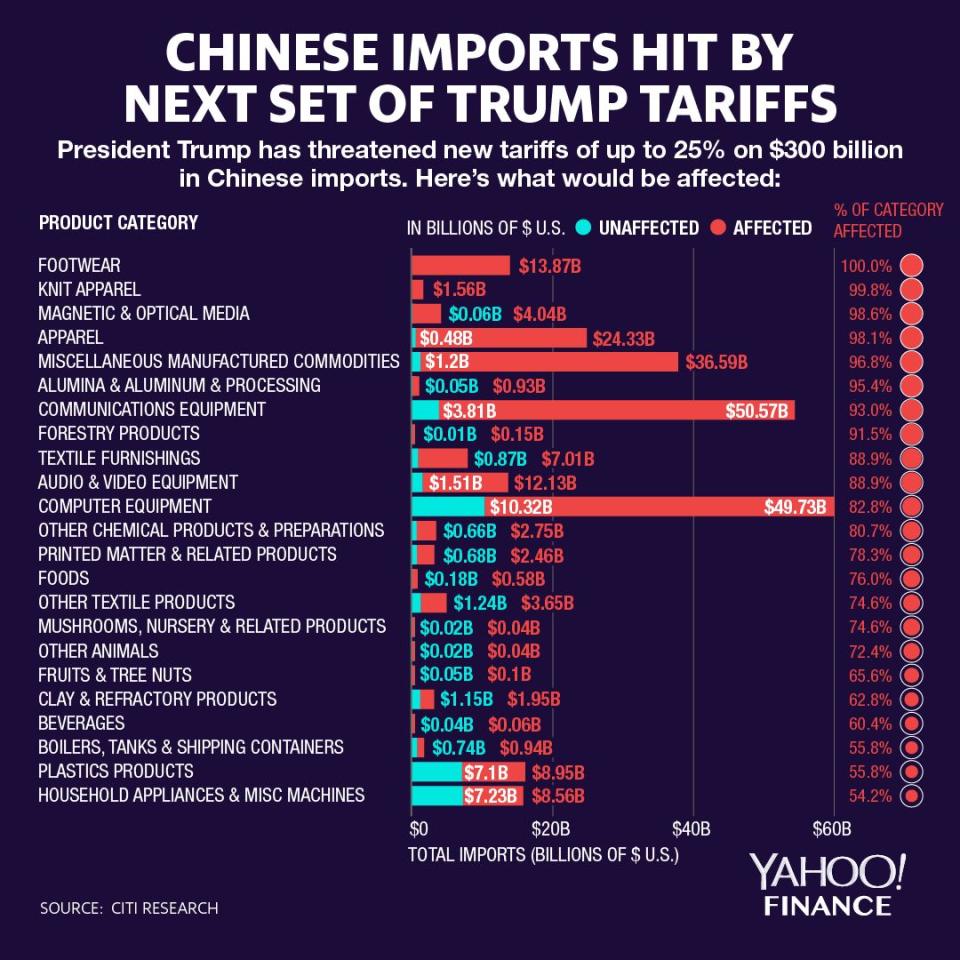New Trump tariffs would affect nearly 70% of consumer goods: Citi
The next time President Trump and Chinese President Xi Jinping will meet will likely be at the G-20 summit in Japan next month. The leaders of the world’s two largest economies will no doubt aim to resolve their long-simmering trade dispute that has the U.S. and China going tit-for-tat on tariffs. If they fail to reach an agreement, there’s a good chance Trump will follow through on his threat to place additional 25% tariffs on $300 billion worth of Chinese goods.
A new report by Citi estimates the impact of additional tariffs on virtually all Chinese imports would be far worse than what consumers have seen so far, because the first round of tariffs focused mainly on capital goods, not goods consumers purchase directly. (On May 10, Trump announced a hike in tariffs to 25% from 10%, on $200 billion of Chinese imports, with China hitting back shortly after.)
According to Citi, the prices of goods impacted by tariffs have stabilized over the past couple of months. But the U.S. Trade Representative office’s list of $300 billion worth of Chinese goods that will be included in the next round of tariffs will represent 67% of total imports of consumer goods from China, 66% of automotive vehicles, 19% of industrial supplies, and 38% of capital goods.

“So far, the impact from trade tensions on the U.S. economy has been small,” Citibank global economist Cesar Rojas told Yahoo Finance. “But if trade tensions escalate further into covering all imports from China, the U.S. consumer sector is going to be impacted even more than it has been so far. Mostly through higher prices on consumer goods.”
“Tariffs on the remaining imports from China would have a larger impact on U.S. consumers than previous rounds,” the report says.
Impact on GDP
If Trump imposes 25% tariffs on consumer goods from that $300 billion USTR list, Citi estimates that those tariffs would lower China’s GDP. Even if China retaliates, Chinese GDP will still be negatively impacted according to Citi.
However, if American firms manage to substitute all imports from China with imports from other countries, there will be no growth dividend for the U.S., and higher prices will hurt consumption and reduce GDP, Citi says.
Inflation
Executives of more than two dozen American companies have made it clear they will raise prices on consumer goods to protect their profit margins and stay competitive. Citi estimates that a 25% tariff would increase inflation by more than three times what the estimated effect of the current tariffs are.
Citi says higher prices on consumer goods could lead other companies to also raise prices on goods that are not facing tariffs to alleviate pressure on their margins.
“What we have seen so far is that there has been some margin compression,” Rojas says. “If you know that your competitors are going to increase their prices but you are also having some issues with your margins, instead of compressing your margins even more, and losing by selling at the lower price, you will also increase your prices. At this point…some firms are prepared to basically pass higher costs to consumers.”
For example, the price of imported washing machines increased by about 12% because of tariffs, but the price of dryers – which weren’t impacted by tariffs – also rose by the same amount.

Sectors impacted the most by tariffs
If Trump pulls the trigger on the $300 billion of Chinese goods, the communications equipment product category will be hit hardest, with $50.57 billion of imports affected by tariffs.
Apparel has not generally been affected by the current set of tariffs, but it will be if the new round goes through, with specialty and department-store retailers negatively impacted, Citi says.
“The group in general has already been suffering from EBIT margin compression over the past five years and with little pricing power (for the majority of companies) we’d expect tariffs to compress margins even more,” the report says. Citi estimates that $24.33 billion of apparel imports will be impacted by tariffs, as well as nearly $14 billion of footwear.
As costs rise, Citi estimates the only companies that will have pricing power are the strongest ones, including Nike and Lululemon. Smaller retailers will try to pass on the cost to consumers but in the end it’s their margins that will end up getting hurt.
The U.S. government is seeking comments from the public about its list of Chinese goods that could be subject to additional tariffs. The deadline for submitting comments is June 17, when there will also be a public hearing on this matter.
Follow Sibile Marcellus on @SibileTV
More from Sibile:
‘Dysfunctional’ Washington is top concern for high-net-worth investors: UBS
Oprah’s longtime partner Stedman Graham on why she’s not running in 2020
Underemployment for recent grads worse today than in early 2000s
